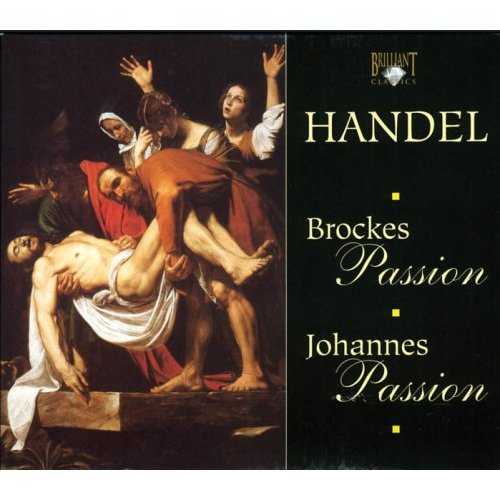
Performer: Istvan Gati, Jozsef Moldvai, Charles Brett, Judit Németh, Ibolya Verebits, et al.
Orchestra: Capella Savaria
Conductor: Nicholas McGegan, Pál Németh
Composer: George Frederick Handel
Audio CD
Number of Discs: 4 CD box set
Format: APE (image+cue)
Label: Brilliant Classics
Size: 834 MB
Recovery: +3%
Scan: yes
Brockes Passion (Der für die Sünde der Welt), oratorio, HWV 48
Composed by George Frideric Handel
Performed by Savaria Capella
with Maria Zadori, Istvan Gati, Eva Lax, Katalin Farkas, Eva Bartfai-Barta, Martin Klietmann
Conducted by Nicholas McGegan
St. John Passion (spurious)
Composed by George Frideric Handel
Performed by Savaria Capella
with Maria Zadori, Ibolya Verebits, Judit Nemeth, Istvan Gati, Jozsef Moldvai, Gabor Kallay, Charles Brett, Martin Klietmann
Conducted by Pal Nemeth
CD1 BROCKES PASSION 1/3
01. Sinfonia
02. Soprano, alto, coro: Mich vom Stricke meiner Sünden
03. Recitativo evangelist: Als Jesus nun zu Tische sasse
04. Accompagnato Jesus: Das ist mein Leib
05. Aria Tochter Zion: Der Gott, dem alle Himmelskreise
06. Recitativo evangelist: Und bald hernach
07. Accompagnato Jesus: Das ist mein Blut
08. Aria Tochter Zion: Gott selbst der Brunnquell
09. Coro: Ach, wie hungert mein Gemüte
10. Recitativo evangelist/Jesus: Drauf sagten sie dem Höchsten Dank
11. Coro: Wir wollen alle eh’erblassen
12. Recitativo Jesus: Es ist gewiss
13. Aria Jesus: Weil ich den Hirten schlagen werde
14. Recitativo Petrus/Jesus: Aufs wenigste will ich
15. Aria Jesus: Mein Vater, mein Vater!
16. Recitativo Jesus: Mich drückt der Sünden
17. Aria Jesus: Ist’s möglich
18. Arioso Tochter Zion: Sünden, schaut mich Furcht
19. Recitativo evangelist: Die Pein vermehrte sich
20. Aria Tochter Zion: Brich, mein Herz
21. Recitativo evangelist: Ein Engel aber kam
22. Arioso Jesus, Petrus, Johannes, Jacobus: Erwachet doch!
23. Recitativo evangelist: Und eh’die Rede
24. Coro: Greift zu, schlagt tot
25. Recitativo evangelist, Judas: Und der Verräter
26. Coro: Er soll uns nicht entlaufen
27. Recitativo Judas, Jesus: Nimm, Rabbi, diesen Kuss
28. Aria Petrus: Gift und Glut
29. Recitativo Jesus: Steck nur das Schwert
30. Coro: O weh, sie binden ihn
31. Recitativo Petrus: Wo flieht ihr hin?
32. Aria Petrus: Nehmt mich mit
33. Recitativo evangelist, Caiphas, Jesus, Kriegsknecht: Und Jesus ward
34. Aria Tochter Zion: Was Bärentatzen, Löwenklauen
35. Recitativo evangelist, Magd 1, Petrus, Magd 2, Magd 3 Dies sahe Petrus an
36. Arioso Petrus: Ich will versinken
37. Recitativo evangelist, Petrus: Drauf krähete der Hahn
CD2 BROCKES PASSION 2/3
01. Aria Petrus: Heul, du Fluch!
02. Recitativo Petrus: Doch wie, will ich
03. Aria Petrus: Schau, ich fall’in strenger Busse
04. Coro: Ach, Gott und Herr
05. Recitativo evangelist, Caiphas, Jesus: Als Jesus nun
06. Coro: Er hat den Tod verdient
07. Aria tenor: Erwäg, erwäg
08. Recitativo evangelist, Tochter Zion: Die Nacht war kaum vorbei
09. Aria Tochter Zion: Meine Laster sind die Stricke
10. Recitativo Judas: Oh, was hab’ich, verfluchter Mensch
11. Aria Judas: Lasst diese Tat nicht ungerochen
12. Recitativo Judas: Unsäglich ist mein Schmerz
13. Aria Tochter Zion: Die ihr Gottes Gnad’versäumet
14. Recitativo evangelist, Jesus: Wie nun Pilatus Jesum fragt
15. Coro: Bestrafe diesen Übeltäter
16. Recitativo Pilatus, evangelist: Hast du denn kein Gehör?
17. Duetto Tochter Zion, Jesus: Sprichst du denn
18. Recitativo evangelist: Pilatus wunderte sich sehr
19. Coro: Nein, diesen nicht
20. Recitativo Pilatus: Was fang’ich denn
21. Coro: Weg, weg, weg!
22. Recitativo Pilatus: Was hat er denn getan?
23. Coro: Weg, weg, weg!
24. Recitativo evangelist: Wie er nun sah
25. Arioso Tochter Zion: Besinne dich, Pilatus
26. Recitativo evangelist: Drauf zerreten die Kriegsknechte
27. Arioso Gläubige Seele: Ich seh’an einen Stein gebunden
28. Recitativo Gläubige Seele: Drum, Seele, schau
29. Aria Gläubige Seele: Dem Himmel gleicht
30. Recitativo evangelist: Wie nun das Blut
31. Aria Tochter Zion: Die Rosen krönen
32. Recitativo Tochter Zion: Verwegner Dorn
33. Aria Tochter Zion: Lass doch diese herbe Schmerzen
34. Recitativo Tochter Zion: Der zarten Schläfen
35. Aria Tochter Zion: Jesu! Jesu
36. Recitativo evangelist: Drauf beugten sie aus Spott
37. Coro: Ein jeder sei ihm untertänig!
38. Recitativo evangelist: Ja, scheueten sich nicht
39. Aria Tochter Zion: Schäumest du, du Schaum der Welt
40. Recitativo evangelist: Worauf sie mit dem Rohr
41. Aria Tochter Zion: Bestürzter Sünder
42. Aria Tochter Zion: Heil der Welt
CD3 BROCKES PASSION 3/3
01. Recitativo evangelist: Wie man ihm nun genug
02. Coro & Tochter Zion: Eilt, ihr angefochten Seelen!
03. Recitativo Maria: Ach Gott, ach Gott!
04. Duetto Maria, Jesus: Soll mein Kind
05. Recitativo evangelist, Tochter Zion: Und er trug selbst sein Kreuz
06. Aria tenor: Es scheint, da den zerkerbten Rücken
07. Recitativo evangelist: Wie sie nun an die Stätte
08. Aria Gläubige Seele: Hier erstarrt mein Herz
09. Recitativo Gläubige Seele: O Anblick, o entsetzliches Gesicht!
10. Coro: O Menschenkind
11. Recitativo evangelist: Sobald er nun gekreuzigt war
12. Coro: Pfui, pfui, pfui!
13. Recitativo evangelist: Und eine dicke Finsternis
14. Aria Gläubige Seele: Was Wunder, dass der Sonnen Pracht
15. Recitativo evangelist: Dies war zur neunten Stund’
16. Arioso Gläubige Seele: Mein Heiland
17. Recitativo evangelist: Drauf lief ein Dienstknecht hin
18. Terzetto: O Donnerwort!
19. Recitativo Gläubige Seele, evangelist: O selig wer dies glaubt
20. Aria Tochter Zion, Gläubige Seele: Sind meiner Seelen tiefe Wunden
21. Recitativo Tochter Zion, evangelist: O Grossmut!
22. Aria Gläubige Seele: Brich, brüllender Abgrund
23. Recitativo Gläubige Seele, Hauptmann: Ja, ja, es brüllet schon
24. Aria Gläubige Seele: Wie kommt’s, dass da der Himmel weint
25. Accompagnato Gläubige Seele: Bei Jesus’ Tod und Leiden
26. Coro: Mein’ Sünd’mich werden krän
27. Aria Tochter Zion: Wisch ab der Tränen scharfe Lauge
28. Coro: Ich bin ein Glied
CD4 JOHANNES PASSION
01. Sinfonia Recitativo evangelist: Da nahm Pilatus Jesum
02. Aria soprano: Unsere Bosheit ohne Zahl
03. Recitativo evangelist: Und die Kriegsknechte Coro: Sei gegrüsset
04. Recitativo evangelist: Und gaben ihm Backenstreiche Arioso Pilatus Sehet, ich führe ihn heraus
05. Recitativo evangelist: Also ging Jesus heraus
06. Duetto soprano I, II: Schauet, mein Jesus ist Rosen zu gleichen
07. Recitativo evangelist: Und er spricht zu ihnen Arioso Pilatus Sehet, welch ein Mensch
08. Recitativo evangelist: Da ihn die Hohenpriester Coro: Kreuzige, kreuzige!
09. Recitativo evangelist: Pilatus spricht zu ihnen Arioso Pilatus Nehmet ihr ihn hin
10. Recitativo evangelist: Die Juden antworteten ihm Coro Wir haben ein Gesetze
11. Recitativo Pilatus, evangelist: Da Pilatus das Wort höret Arioso Pilatus: Redest du nicht mit mir?
12. Recitativo evangelist: Jesus antwortet Aria Jesus: Du hättest kein Macht über mir Recitativo evangel
13. Aria soprano: Durch dein Gefängnis
14. Recitativo evangelist: Die Juden aber schrieen Coro Lässest du diesen los
15. Recitativo evangelist: Da Pilatus das Wort höret Arioso Pilatus: Sehet, das ist euer König!
16. Recitativo evangelist: Sie schrieen alle Coro: Weg, weg mit dem
17. Aria basso: Erschüttere mir Krachen
18. Recitativo evangelist: Spricht Pilatus zu ihnen Arioso Pilatus: Soll ich euren König kreuzigen?
19. Recitativo evangelist: Die Hohenpriester antworteten Coro: Wir haben keinen König
20. Recitativo evangelist: Da überantwortet er ihn
21. Aria alto: Getrost, mein Herz
22. Recitativo evangelist: Pilatus aber schrieb eine Überschrift Coro: Schreib’nicht “Der Juden König” R
23. Recitativo evangelist: Die Kriegsknechte aber
24. Aria tenore: Du musst den Rock verlieren
25. Recitativo evangelist: Der Rock aber war ungenäht Coro: Lasset uns den nicht zerteilen
26. Recitativo evangelist: Aus dass erfüllet würde Schrift Accompagnato evangelist: Sie haben meine Klei
27. Duetto tenore I, II: Welche sind des Heilands Erben?
28. Recitativo evangelist: Es stund aber bei dem Kreuz Arioso Jesus: Weib, siehe, das ist dein SohnRecit
29. Recitativo evangelist: Und von Stund an Arioso Jesus: Mich Dürstet!
30. Aria soprano: Jesu, wonach dürstet dich
31. Recitativo evangelist: Da stund ein Gefäss voll Essig Arioso Jesus: Es ist vollbracht!
32. Aria basso: O grosses Werk Recitativo evangelist: Und neigte das Haupt und verschied
33. Aria soprano: Bebet, ihr Berge
34. Recitativo evangelist: Die Juden aber
35. Duetto soprano, basso: War das Wasser denn zu schlecht
36. Recitativo evangelist: Und der es gesehen hat
37. Duetto soprano, basso: Ich gehe mit in’s Grab
38. Recitativo evangelist: Es war aber an der Stätte
39. Coro: Schlafe wohl nach deinen Leiden
handel_brockes_passion_johannes_passion_cd_2.rar – 215.4 MB
handel_brockes_passion_johannes_passion_cd_3.rar – 182.8 MB
Handel Rarities from Hungary
1) Brockes-Passion:
George Frideric Handel (1685 – 1759): Brockes-Passion. Performed by: Martin Klietmann (tenor, evangelist); István Gáti (baritone, Jesus); Mária Zádori (soprano, Daughter of Zion); Katalin Farkas, Éva Bártfai-Barta (sopranos); Éva Lax (contralto); Drew Minter, Péter Baján, Tamás Csányi (countertenors); Guy de Mey, János Bándi (tenors); Gunther Burzynski (baritone); Stadtsingechor Halle; Capella Savaria; dir. (from the harpsichord?) by Nicholas McGegan. Recorded in 1994 by Hungaroton on 3 CDs. Licensed re-release also available as part of the Handel Masterworks series from Brilliant Classics (99777-13/15). Total playing time: approx. 2 hrs 45 mins.
Handel’s works are generally to Italian or English texts, and to find a German-language passion oratorio by him can be a surprise. In fact, he appears to have written it around 1716/1717 after spending an extended “vacation” in his German homeland. The libretto by the pious Hamburg poet Barthold Hinrich Brockes was very much “en vogue” at the time and was set to music by no less than four well-known composers: Keiser, Mattheson, Telemann and Handel himself. Typically for the Protestant German tradition of the time, it tells the story of the arrest, trial and death of Jesus Christ, but not strictly in the words of the Gospels; rather, the words of the Gospels are put into poetic form and complemented by pious comments allegedly coming from those involved in the story. In a sense, this was a musical “set piece”, and although Handel obviously took a certain amount of trouble over the work, it is not to be expected that it should be particularly original. While listening to it, I heard parallels to other works by Handel, but also anticipations of Bach’s passions – meaning not that Bach “copied” Handel, but rather that both were working within the framework of a common tradition. And of course, the libretto was not tailor-made for Handel’s needs, so it is perhaps not surprising that some of the music sounds a little “forced”. Nonetheless, there are any number of fine moments to be heard here, and those who love everything Handel wrote will enjoy themselves thoroughly.
The performance is good, with some highlights and some passages which are less brilliant. Martin Klietmann is a fine evangelist; he never reaches the heights of, say, Howard Crook in his role as the evangelist in Bach’s passions (under the baton of Philippe Herreweghe), but his declamation is clear and his involvement plain without ever drifting into false emotionalism. Of the other singers, it is Drew Minter, and to a lesser extent Guy de Mey, who really stick out with clear and excellent enunciation and superbly controlled voices. The Hungarian singers involved in this production all have very nice-sounding voices, too, but in varying degrees they also all suffer from a more-or-less thick Hungarian accent, which not only makes following the text more difficult or, on occasion, impossible, but can also bring a smile to one’s lips. (I should say that I have the Brilliant Classics edition which has no printed libretto; I speak German fluently and found it not too difficult to follow the action, but it was obvious that some of the soloists were having problems with the German text.) The Capella Savaria is, I believe, Hungary’s oldest period-instrument orchestra and has often worked with Nicholas McGegan. Their playing is here inspired by his leadership, but it is, to my mind, still possible to hear that their instruments are not really up to the standard of equivalent Western orchestras (particularly in the strings). The harpsichord continuo, on the other hand, is exceptionally good. The Stadtsinge-Chor Halle is presumably a large amateur choir; its role in the oratorio is limited, but it seemed to be very well-disciplined.
The recorded sound is good without being special. I don’t know whether this is legitimate, but I seemed to hear an improvement on the Brilliant Classics discs after transferring them carefully to hard disc and re-burning them on good-quality CD-R’s.
2) Johannes-Passion. Performed by: Martin Klietmann (tenor, evangelist); József Moldvay (baritone, Jesus); Charles Brett (countertenor, Pilate); Mária Zádori and Ibolya Verebics (sopranos); Judith Németh (mezzosoprano); Gábor Kállay (tenor); Istvàn Gáti (baritone); Chamber Choir; Capella Savaria, dir. Pál Németh. Recorded in 1995 by Hungaroton and re-issued on Brilliant Classics as part of their Masterworks series. Total playing time: 60 minutes.
The biggest question hanging over this production is whether the St. John Passion which was first performed in the year 1704 in the city of Hamburg was, in fact, written by the 19-year-old up-and-coming Georg Friedrich Händel (that’s the German spelling of his name) or not. In their somewhat clumsily-produced notes, Brilliant Classics argue for the piece’s authenticity on the basis of criticism made by Johann Matheson, who, however, did not expressly name Handel as the composer. After listening to the whole work, I personally felt that, although the composer must have been a considerably gifted craftsman, I was probably NOT hearing music by Handel – this all sounds so thoroughly different to the music which he produced just a few years later in Italy; it is thoroughly North German sacred or church music: the text of chapter 19 of John’s Gospel (in the Luther translation) plus a number of pious “Betrachtungen” (meditations) by the libretto author Christian Postel, who worked, in the main, for Keiser. We shall probably never know who really penned this work.
Having said that, it is still eminently worth listening to, both because it is the first known example of a passion oratorio in Germany (i. e. using orchestral forces as an accompaniment) and because the performance by the mainly Hungarian forces is rather well done. There are, as one might expect, a few difficulties with German enunciation here and there (particularly in pieces sung by Ibolya Verebics), but on the whole the text comes over clearly and quite comprehensibly, and it became obvious to me that Pál Németh had devoted a good deal of industry to getting this right. The small choir sounded even better than the large one on the Brockes Passion, and the instruments have some delightful moments – here too, the harpsichord continuo I found to be exceptionally good. In the end, I suppose the composition itself is not quite up to later Handelian standards (and certainly cannot be compared with Bach’s St. John Passion), but it definitely provides an hour of both serious entertainment and entertaining devotion. Particular praise also goes here to Charles Brett and Martin Klietmann, whose declamation is wonderfully clear. Soprano Mária Zádori, too, is able to show off her beautiful timbre and her vocal agility to the best advantage.
Slightly Uneven Recording of a Neglected Handel Work to a German Libretto
George Frideric Handel (1685 – 1759): Brockes-Passion. Performed by: Martin Klietmann (tenor, evangelist); István Gáti (baritone, Jesus); Mária Zádori (soprano, Daughter of Zion); Katalin Farkas, Éva Bártfai-Barta (sopranos); Éva Lax (contralto); Drew Minter, Péter Baján, Tamás Csányi (countertenors); Guy de Mey, János Bándi (tenors); Gunther Burzynski (baritone); Stadtsingechor Halle; Capella Savaria; dir. (from the harpsichord?) by Nicholas McGegan. Recorded in 1994 by Hungaroton on 3 CDs. Licensed re-release also available as part of the Handel Masterworks series from Brilliant Classics (99777-13/15). Total playing time: approx. 2 hrs 45 mins.
Handel’s works are generally to Italian or English texts, and to find a German-language passion oratorio by him can be a surprise. In fact, he appears to have written it around 1716/1717 after spending an extended “vacation” in his German homeland. The libretto by the pious Hamburg poet Barthold Hinrich Brockes was very much “en vogue” at the time and was set to music by no less than four well-known composers: Keiser, Mattheson, Telemann and Handel himself. Typically for the Protestant German tradition of the time, it tells the story of the arrest, trial and death of Jesus Christ, but not strictly in the words of the Gospels; rather, the words of the Gospels are put into poetic form and complemented by pious comments allegedly coming from those involved in the story. In a sense, this was a musical “set piece”, and although Handel obviously took a certain amount of trouble over the work, it is not to be expected that it should be particularly original. While listening to it, I heard parallels to other works by Handel, but also anticipations of Bach’s passions – meaning not that Bach “copied” Handel, but rather that both were working within the framework of a common tradition. And of course, the libretto was not tailor-made for Handel’s needs, so it is perhaps not surprising that some of the music sounds a little “forced”. Nonetheless, there are any number of fine moments to be heard here, and those who love everything Handel wrote will enjoy themselves thoroughly.
The performance is good, with some highlights and some passages which are less brilliant. Martin Klietmann is a fine evangelist; he never reaches the heights of, say, Howard Crook in his role as the evangelist in Bach’s passions (under the baton of Philippe Herreweghe), but his declamation is clear and his involvement plain without ever drifting into false emotionalism. Of the other singers, it is Drew Minter, and to a lesser extent Guy de Mey, who really stick out with clear and excellent enunciation and superbly controlled voices. The Hungarian singers involved in this production all have very nice-sounding voices, too, but in varying degrees they also all suffer from a more-or-less thick Hungarian accent, which not only makes following the text more difficult or, on occasion, impossible, but can also bring a smile to one’s lips. (I should say that I have the Brilliant Classics edition which has no printed libretto; I speak German fluently and found it not too difficult to follow the action, but it was obvious that some of the soloists were having problems with the German text.) The Capella Savaria is, I believe, Hungary’s oldest period-instrument orchestra and has often worked with Nicholas McGegan. Their playing is here inspired by his leadership, but it is, to my mind, still possible to hear that their instruments are not really up to the standard of equivalent Western orchestras (particularly in the strings). The harpsichord continuo, on the other hand, is exceptionally good. The Stadtsinge-Chor Halle is presumably a large amateur choir; its role in the oratorio is limited, but it seemed to be very well-disciplined.
The recorded sound is good without being special. I don’t know whether this is legitimate, but I seemed to hear an improvement on the Brilliant Classics discs after transferring them carefully to hard disc and re-burning them on good-quality CD-R’s.
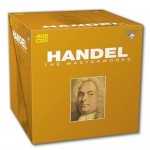
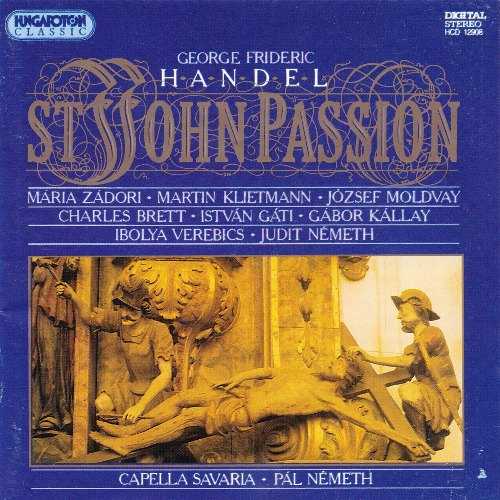
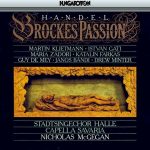
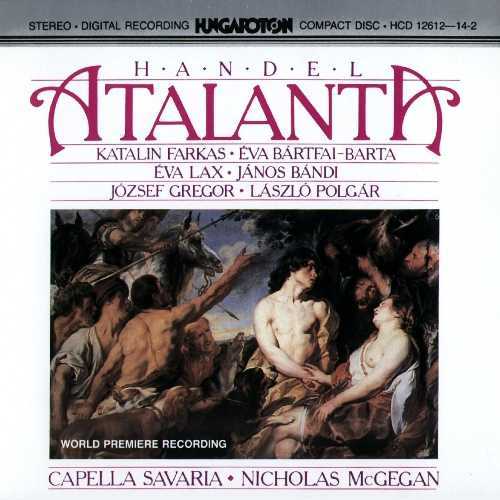
Thank you so much.
I have so much Handel (my favorite baroque composer) but never heard these before. Thank you very much.
Gracias : )
Thank you
Thanks for sharing.